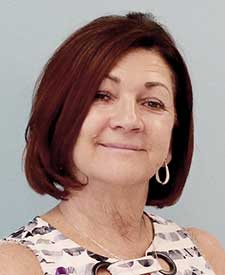
Registered nurse and director of Adult Family Care Jeanne Leyden
By Jeanne Leyden
Falls are perennially the leading cause of injury for older adults, but they are not an inevitable outcome of aging. Fortunately, there are several easy ways to reduce the risk of falls.
A good first step is to acknowledge the risk. One in four Americans over the age of 65 is affected by a fall each year, according to the Centers for Disease Control and Prevention (CDC). That averages out to an emergency room visit every 11 seconds. While it’s easy to think it will never happen to you, it’s better to be aware of potential risk and be proactive about reducing it.
The CDC cautions that most falls are caused by combination of the following factors:
- Lower body weakness
- Vitamin D deficiency
- Difficulties with walking and balance
- Use of medicines
- Vision problems
- Foot pain
- In-home hazards
As director of a program that helps families provide care at home, this issue is very near to my heart. I firmly believe the best care is at home and helping family caregivers reduce the risk of falls is a big part of our safety assessments and ongoing trainings for caregivers.
Here are some tips for reducing the most common risk factors for falls:
Keep your home safe Evaluate your home for fall hazards. Remove obstacles, such as rugs or clutter that might cause you to trip. Make sure areas like entryways are well-lit. Install grab bars where needed, such as in the bathroom or near the front door. You might also consider consulting an occupational therapist to assess your home and make recommendations.
Talk to your doctor Don’t be afraid to mention that you’ve had a fall or are afraid of falling. Your doctor will be able to assess your risk of future falls and recommend strategies to help.
Review medications Your doctor or pharmacist can determine whether any of your prescriptions or over-the-counter medications increase fall risk. They may also be able to recommend alternatives with less risk. It’s important to review your medications regularly, and to verify that you are taking them only as prescribed.
Check vision and hearing Don’t skip those annual appointments! Your ability to hear and see can greatly impact your balance and your ability to avoid obstacles.
Find a balance or exercise program Evidence-based in-home programs such as Stay Strong have been proven to reduce fall risk by increasing strength and stability. Your local senior center or elder services agency probably offers that or something similar, often at no charge.
Jeanne Leyden is a registered nurse and director of Adult Family Care, a non-profit program at Somerville-Cambridge Elder Services that provides training and compensation for family caregivers across the Greater Boston, North Shore, and Merrimack Valley areas. For more information, visit adultfamilycare.org or call 617-628-2601.















Reader Comments